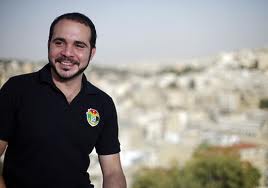By Andrew Warshaw in Amman
February 25 – Asia’s FIFA vice-president has added his voice to those who believe the issue of workers’ rights in Qatar has become far more crucial than whether the 2022 World Cup is played in winter or summer. But, said Jordan’s Prince Ali bin al Hussein, the Gulf state had to be given a fair chance to prove it can implement the measures it promises will be put in place in order to ease the plight of migrant workers.
“It is the crucial issue and has to be dealt with as soon as possible,” said Prince Ali. “If they set their minds to it they can do it. Maybe they feel sometimes a little bit guarded because of what they perceive as the level of attention …but I want to encourage as much as I can their ability to host.”
Prince Ali is among the increasing number of powerbrokers who feel that switching the tournament to winter is a far better option than the heat of the Gulf summer but says too much focus is being placed on Qatar with two other World Cups to come first, both of which have their own more immediate challenges.
“Brazil is having its problems as we know and then you have Russia which, shall we say, will be interesting. Every host has its challenges. Of course Qatar wants to stage a great World Cup and it knows it has to abide by world standards.”
Without mentioning the specific and high-publicised cases of footballers Zahir Belounis and Abdeslam Ouaddou, who were victims of Qatar’s notorious kafala employment system and were only allowed to leave the country following intense international pressure, Prince Ali said Qatar was more than capable of changing its ways. “From what I’ve seen, they have the ability to change if they put their minds to it. We need to just encourage them and not judge them too fast.”
In a wide-ranging interview with Insideworldfootball in the Jordanian capital, Prince Ali, head of his country’s FA, played down suggestions that support is growing in his continent to call for Israel to be thrown out of FIFA because of its intransigence over lifting restrictions on Palestinian players and officials.
Thousands of Palestinian refugees have found safe haven in Jordan since Israel was established in 1948 and are now Jordanian citizens. Last week, Jibril Rajoub, chairman of the Palestinian Football Association, was reported as saying he had the support of Jordan as well as Iran, Qatar, Oman, Algiers and Tunisia for drafting a resolution seeking the expulsion of Israel at the next FIFA Congress in June.
Prince Ali countered this by saying Jordan had made no such commitment but admitted that efforts to find a solution had been hindered by the fact that Palestine and Israel are from different Confederations.
“Israel being part of UEFA and Palestine being part of AFC causes complications,” he said. “Ultimately, for both us and UEFA, because of this the issue has to fall under the umbrella of FIFA.”
FIFA President Sepp Blatter is to travel once again to the region in April in a bid to further improve relations between the two sides. Prince Ali said this was the only approach that was likely to bear fruit but warned that if mediation failed to succeed and Israel did not meet FIFA statutes, then Palestine could not be blamed for taking its case to the entire FIFA membership.
“President Blatter has to be the one to resolve this issue,” he said. “If he cannot do that, then Palestine has the right to take this to Congress.”
With match-fixing having become by far the most troublesome issue throughout Asian football, Prince Ali revealed how around two years ago, he proposed an index system to FIFA whereby countries most guilty of match-fixing would receive less financial support to their national federations.
It seems on paper like a great concept but nothing came of it.
“The idea was to set up an independent body and that if there was a lot of match-fixing going on in a particular place, the country concerned would be judged accordingly in a ranking system,” Prince Ali said. “The system would have affected any support from FIFA that goes to a particular association. I thought it would pressure associations to pressure their own governments, to show them that match-fixing would directly affect them. I was told it was a good idea but it wasn’t followed up. There needs to be more co-ordination in how to deal with this.”
With the FIFA presidency up for re-election in 15 months’ time, Prince Ali was non-committal when asked if he thought Blatter would end up once again standing unchallenged. But whoever wins, he said, has to have a proper programme in place rather than just spin his way to victory in May, 2015.
Prince Ali, who won a place on FIFA’s executive committee in 2011 and is planning to run again as Asia’s FIFA vice-president when the position comes up for renewal next year, said FIFA’s presidential campaign should mirror his own modus operandi. “Whoever runs has to have a proper programme, not just based on personality. That’s what I did but I have seen others who sometimes don’t.”
Contact the writer of this story at moc.l1745291653labto1745291653ofdlr1745291653owedi1745291653sni@w1745291653ahsra1745291653w.wer1745291653dna1745291653


